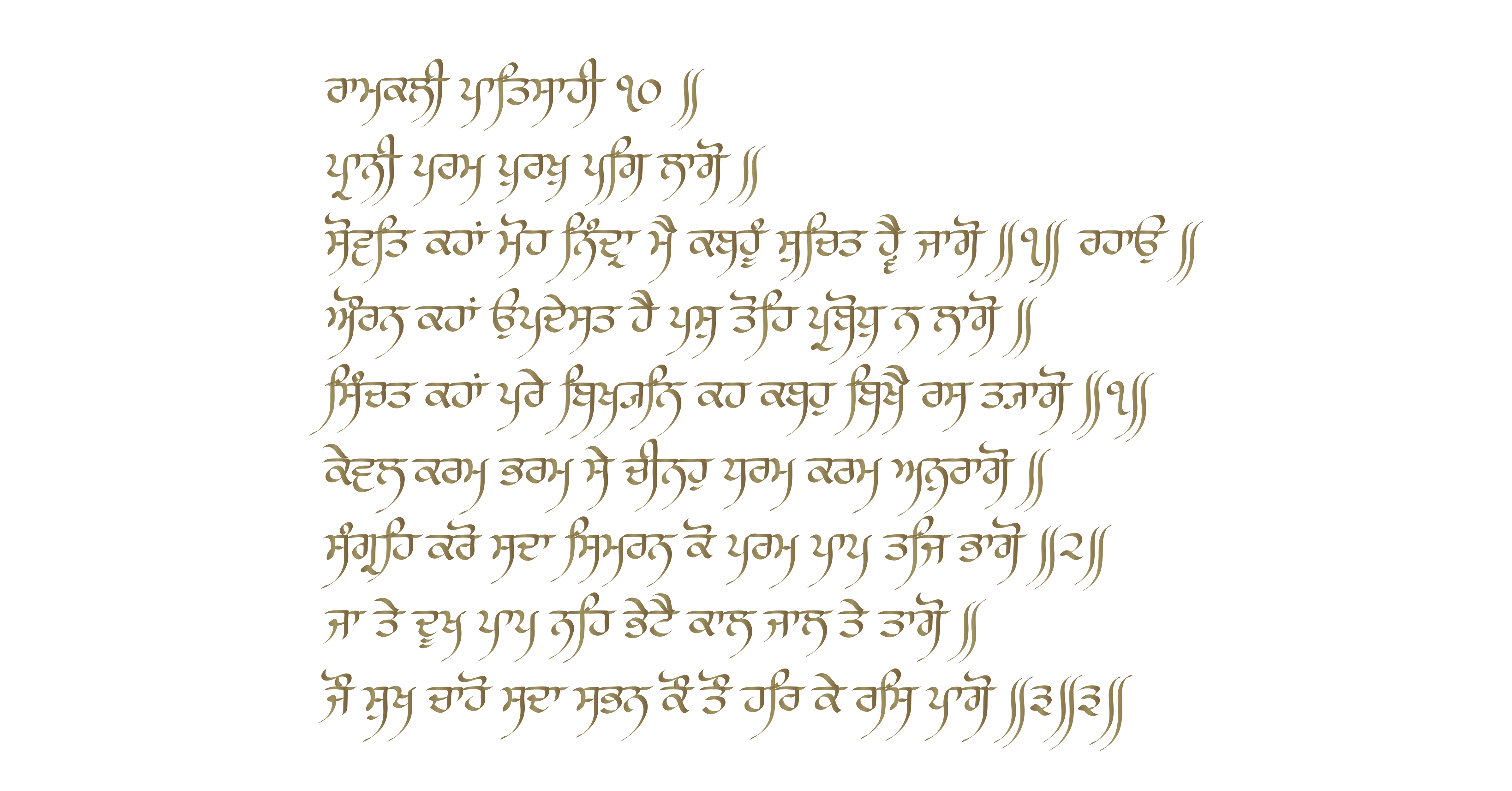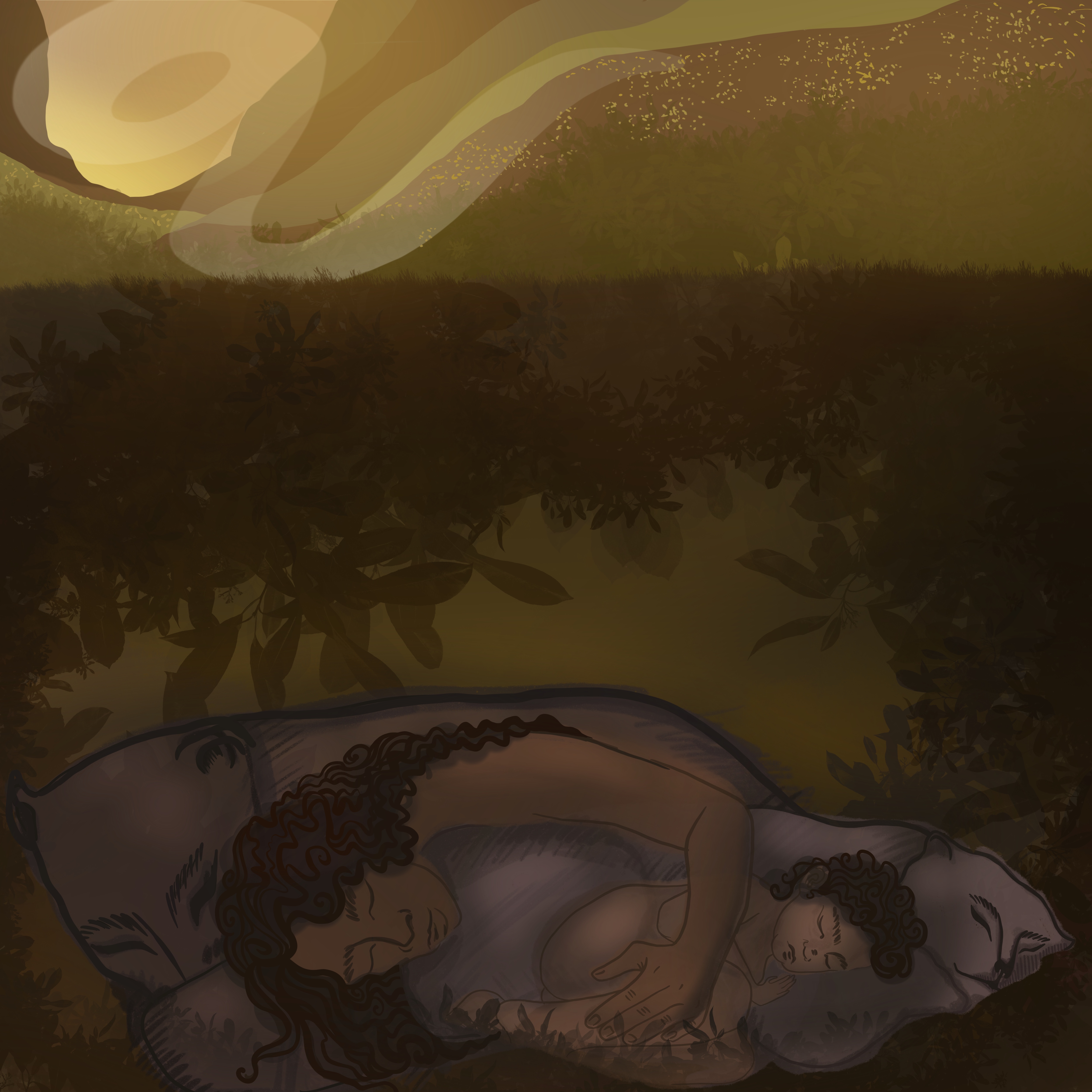Sabad Hajare Patisahi 10 - Sabad 03: Mentor Specified
.svg)

Mentor Specified
Who is the best mentor?
Ramkali Sovereign 10
O being, attach to the feet of the Supreme Being.
Why are you asleep in attachment’s sleep? Awaken sometime to be attentive! Pause-reflect.
O animal-like, why do you preach to others? You are not attached to the teachings.
Why are you collecting the poisons? When will you renounce the flavor of poisons?
Realize performing only the deeds as an illusion; love the principled deeds.
Always collect the remembrance, run away from the great sin.
Such that you don’t submit to the pain and the sin, you must confront the death-web.
If you always want all kinds of comforts, then drench yourself in the flavor of Hari-1.
Ramkali musical mode invokes mood and emotions of discipline, pain, and triumph.
In Indic tradition, people bend down before elders and “spiritual” beings to touch their feet with their hands. It is a mark of total respect and complete submission of the ego, though reduced to an obligatory ritual in South Asian cultural norms. In the struggle to navigate the dreadful world-ocean, liberation is achievable by clinging to the feet, the divine feet, or the lotus-feet. In feet is the attitude of humility; the seeker is guided and directed.
Why am I sleeping so deeply in ignorance, entangled in attachments to things and relationships? Will I ever wake up from my laziness and lethargy and become conscious, alert, and vigilant? Guru Gobind Singh Sahib, the Sovereign, tells me to cling to the feet of the 1, to seek mentorship from the 1, and to revere the 1 humbly. The 1 is the Supreme Being: the Protector of the universe, the Almighty, the Timeless, and the Deathless.
The Sovereign asks the animal in me, the foolish and ignorant beast in me: How come you are preaching to others? Do you believe in the teaching? Did the advice have any effect on you? Has your behavior changed? Why are you collecting the poisons? Why are you nurturing the vices? Will you, at some point, stop the poison’s flavors, the indulgence in enjoying the desire’s cravings?
Will I realize that going through the motions of doing ritualistic or prescribed deeds is actually an illusion of doing good? Will I actually develop a love for and enjoy principled deeds? Dharam karam are deeds that are not only “religious” per se but are beyond the norms of a particular era, custom, discipline, or religion. The principled deeds are eternal, natural, true, real, cosmic, and much more. Will I always gather the remembrance? Do I have the devotion and love as companions to collect the 1’s memory? Will I run away from the great sins and discard major transgressions from my behavior?
Am I not interested in not getting taken in by the pain and the sorrow of separation? Am I not interested in knowing and escaping the incredibly terrifying web of death, the fear of death? Am I not interested in pursuing the complete comfort or happiness of “union” at all times? If so, I must color myself in the 1, taste the flavor of Hari, and drench myself in the love of the 1.
The Sovereign reminds me not to perform rituals just because it is a tradition, custom, or norm. Will I stop and submit to be mentored by the 1-Perfect-Powerful? I must, for the pangs of separation are too strong. I must, for the flavors of the union are very colorful. I must, for love with the 1 is forever.
Note: We are very finite; our understanding is finite too. We aspire to deepen our relationship with the Guru. In this translation and commentary, we focused more on meaning, context, and message and less on literalism and poetics. We aspire to learn and live the message to end our separation from the 1.

This artwork, inspired by Guru Gobind Singh's composition, explores the idea that our habits, distractions, and animalistic tendencies can hinder our ability to connect with the ੧/IkOankar/the One. We are addressed by our most base function, breathing, and asked why we are in this deep sleep. Sleep here symbolizes ignorance and unawareness. “Moh nindrā,” the sleep of attachment, is shown with the two bear-like creatures in a state of hibernation, layered with the image of a mother and a child in a similar position. Their skin color and hair texture indicate that the baby is the child of the woman pictured next to them. These artistic choices have no further symbolism other than to show the relationship, the ‘love,’ the attachment. The hibernating animals and people are semi-comatose and trapped below ground in what is described as a “bikhai”/poison. There is no tunnel leading them out; it will require considerable effort to emerge from this underground cave that separates them from the light and the ੧ above. This ignorance, fueled by attachment to their child or parent and their nature as a hibernating creature, keeps them from finding the One. When we let go of the poison and rouse ourselves out of this deep sleep, we can taste the sweetness of joy. The joy is symbolized by the fields of yellow flowers and the ੧ that runs over the landscape.
Note: Where there is greenery, there is ‘natural life.’ I situate the readers, the learners, and seekers, those engaging with the composition there. In every artwork, I have placed ੧, a reference to IkOankar, the One, without limiting it to an object-based depiction such as a sun or a moon. The colors are chosen intentionally to evoke a particular interpretation or adhere to a cohesive color palette to show the relationship between the ten compositions of Guru Gobind Singh Sahib.
ਰਾਮਕਲੀ ਪਾਤਿਸਾਹੀ ੧੦
ਪ੍ਰਾਨੀ ਪਰਮ ਪੁਰਖੁ ਪਗਿ ਲਾਗੋ॥
ਸੋਵਤਿ ਕਹਾਂ ਮੋਹ ਨਿੰਦ੍ਰਾ ਮੈ ਕਬਹੂੰ ਸੁਚਿਤ ਹ੍ਵੈ ਜਾਗੋ॥੧॥ ਰਹਾਉ॥
ਔਰਨ ਕਹਾਂ ਉਪਦੇਸਤ ਹੈ ਪਸੁ ਤੋਹਿ ਪ੍ਰਬੋਧੁ ਨ ਲਾਗੋ॥
ਸਿੰਚਿਤ ਕਹਾਂ ਪਰੇ ਬਿਖ੍ਯਨਿ ਕਹ ਕਬਹੁ ਬਿਖੈ ਰਸ ਤ੍ਯਾਗੋ॥੧॥
ਕੇਵਲ ਕਰਮ ਭਰਮ ਸੇ ਚੀਨਹੁ ਧਰਮ ਕਰਮ ਅਨੁਰਾਗੋ॥
ਸੰਗ੍ਰਹਿ ਕਰੋ ਸਦਾ ਸਿਮਰਨ ਕੋ ਪਰਮ ਪਾਪ ਤਜਿ ਭਾਗੋ॥੨॥
ਜਾ ਤੇ ਦੂਖ ਪਾਪ ਨਹਿ ਭੇਟੈ ਕਾਲ ਜਾਲ ਤੇ ਤਾਗੋ॥
ਜੌ ਸੁਖ ਚਾਹੋ ਸਦਾ ਸਭਨ ਕੌ ਤੌ ਹਰਿ ਕੇ ਰਸਿ ਪਾਗੋ॥੩॥੩॥
rāmkalī pātisāhī 10
prānī param purakhu pagi lāgo.
sovati kahāṁ moh nindrā mai kabahūṁ sucit hvai jāgo.1. rahāu.
auran kahāṁ updesat hai pasu tohi prabodhu na lāgo.
siñcit kahāṁ pare bikhyani kah kabahu bikhai ras tayāgo.1.
keval karam bharam se cīnahu dharam karam anurāgo.
saṅgrahi karo sadā simran ko param pāp taji bhāgo.2.
jā te dūkh pāp nahi bheṭai kāl jāl te tāgo.
jau sukh cāho sadā sabhan kau tau hari ke rasi pāgo.3.3.
This Content has been made available for educational purposes only. SikhRI does not make any representation concerning the completeness of the Content. This Content is not intended to substitute research or a deeper understanding of the topic. SikhRI encourages readers to read multiple authors to gain a complete understanding of the topic.
The Sikh Research Institute recognizes its responsibility to correct any factual, minor, or significant errors promptly. Please contact us via email to request a correction if you have identified one.
Suggest a correction →.svg)
The essay explores Guru Harigobind Sahib’s emergence amidst familial ambitions, his pivotal role in shaping the Sikh faith, and his encounters with Emperor Jahangir. It delves into his compassion and unwavering support for Mata Kaulan.
The essay explores Guru Harigobind Sahib’s emergence amidst familial ambitions, his pivotal role in shaping the Sikh faith, and his encounters with Emperor Jahangir. It delves into his compassion and unwavering support for Mata Kaulan.
.svg)
Explore the profound journey of Guru Harikrishan Sahib, the eighth Sikh Guru, as the Guru navigates complex family dynamics and spiritual succession.
Explore the profound journey of Guru Harikrishan Sahib, the eighth Sikh Guru, as the Guru navigates complex family dynamics and spiritual succession.
.svg)
While reading the Guru Granth Sahib, we encounter various stanza structures within a Sabad, often indicated through corresponding titles on the Sabad. This diversity in stanza structures arises due to variations in the number of lines in the stanzas.
While reading the Guru Granth Sahib, we encounter various stanza structures within a Sabad, often indicated through corresponding titles on the Sabad. This diversity in stanza structures arises due to variations in the number of lines in the stanzas.
Stay informed with our weekly updates, important events and more at SikhRI.